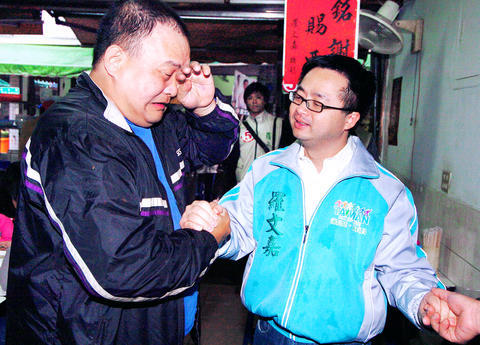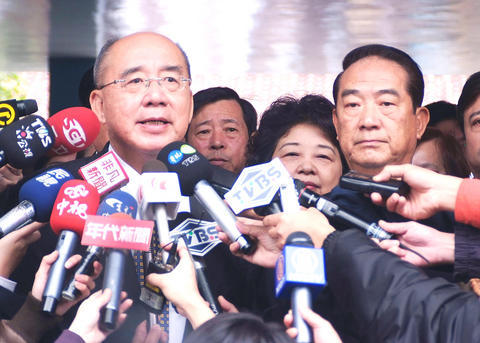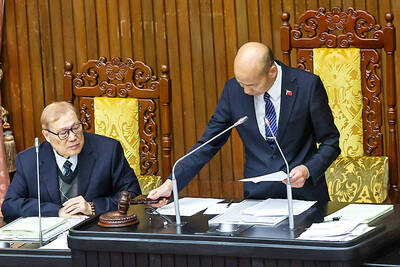Democratic Progressive Party (DPP) presidential candidate Frank Hsieh (
"I will be fully responsible for the March election," Hsieh said.
The DPP suffered a bruising defeat in Saturday's legislative elections, obtaining only 27 out of 113 legislative seats.

PHOTO: LIAO CHEN-HUEI, TAIPEI TIMES
The Chinese Nationalist Party (KMT) garnered 81 seats, securing a comfortable two-thirds majority in the legislature.
President Chen Shui-bian (陳水扁) resigned on Saturday night as party chairman to shoulder the responsibility.
Hsieh is expected to take over the position, pending the approval of the party's Central Executive Committee, which is scheduled to meet today.

PHOTO: CNA
Hsieh told reporters in Taipei yesterday that it was his "inescapable responsibility" to take over the party's helm for the sake of preserving the hope of Taiwan's democracy and survival.
While Hsieh said he respected the choice of the people in Saturday's elections, he added that it would be a crisis in the country's democratic development if the legislature were controlled by a single party.
While some worried that the KMT's momentum following Saturday's elections could carry over into March, Hsieh said the DPP must humbly reflect on its approach and attract the enthusiasm of voters to prevent such a scenario from becoming reality.
Hsieh spokesman Chao Tien-lin (趙天麟) said that Hsieh told his campaign team after the election results were announced on Saturday night that everybody must prepare themselves for "a fight to win or die" and "cut off all avenues of retreat."
In related news, following Chen's resignation, former DPP chairman Yu Shyi-kun stepped down yesterday as commander-in-chief of Hsieh's campaign headquarters and three other party positions.
Yu aides said Hsieh would dictate future campaign strategy and Yu would do his best to campaign for Hsieh if the latter needed help.
At a rally called "shouldering responsibility for Taiwan" at Kaohsiung's Glory Pier (光榮碼頭) last night, Hsieh outlined his "Happy Economy" policy, a key part of his manifesto for the election.
Countering Ma's comments that his policy meddled with the free market, Hsieh said providing a stable economy was the inescapable responsibility of a government.
"Economic hardships, like housing and employment difficulties, cannot be termed `free market' -- they are failures on the part of the government to ensure the quality of life for its people," he said. "The KMT did not win the election because they are a particularly good party, but because the DPP had not done its job well. We heard and thank the people for giving us a warning and a lesson; the stronger the wind ahead, the more I must move forward."
At a separate setting yesterday, KMT presidential candidate Ma Ying-jeou (馬英九) urged party members not to be too excited about the party's victory in the elections and pledged that the party would not abuse its power as the dominant party in the legislature.
"`Power tends to corrupt; absolute power corrupts absolutely.' The KMT should remember this saying. If we are too arrogant with victory, we will lose the presidential election," Ma said yesterday while visiting the mausoleum of former president Chiang Ching-kuo (
With the support of four Non-Partisan Solidarity Union legislators, the KMT would have a three-quarters majority and could put constitutional amendments to a referendum.
Welcoming the party's victory with caution, Ma promised not to use the legislative power to initiate another motion to recall Chen and pledged to start a new era if the party won the presidential election in March.
"We want to present people a completely new image. It will not be the restoration of old times if we regain power in March. Instead, it will be the beginning of a new era," Ma said.
Ma said the party would make the necessary preparations for the new legislature, which will begin in two weeks.
KMT Chairman Wu Poh-hsiung (吳伯雄) said on Saturday night the party would support Legislative Speaker Wang Jin-pyng (王金平) to continue serving as the legislative leader.
The party will select the vice speaker through what Wu said would be a "democratic mechanism" among some hopefuls, including KMT legislators Wu Den-yih (吳敦義), Hung Hsiu-chu (洪秀柱) and Huang Chao-shun (黃昭順).
The victory of the pan-blue camp in the legislative elections also brought attention to the issue of the merger of the KMT and the People First Party (PFP), as the two parties worked closer during the elections via a KMT-PFP joint nomination mechanism.
Both Wu Poh-hsiung and PFP Chairman James Soong (
"We won't discuss this issue today ... We will wait and see," Soong said yesterday during the visit to Chiang's resting place.
The KMT-PFP alliance nominated six legislative candidates while registering legislator-at-large candidates under the KMT.
Five out of the six PFP legislative candidates grabbed seats in the elections.
The New Party, also a member of the pan-blue camp, however, said that despite its poor performance in the elections it would not seek to merge with the KMT.
The party fielded 10 legislator-at-large candidates, but none made it to the Legislative Yuan, as the party only received 4 percent of votes.
New Party Chairman Yok Mu-ming (郁慕明), who also visited Chiang's tomb yesterday, said the party would continue to exist and would not consider merging with the KMT.

DEFENDING DEMOCRACY: Taiwan shares the same values as those that fought in WWII, and nations must unite to halt the expansion of a new authoritarian bloc, Lai said The government yesterday held a commemoration ceremony for Victory in Europe (V-E) Day, joining the rest of the world for the first time to mark the anniversary of the end of World War II in Europe. Taiwan honoring V-E Day signifies “our growing connections with the international community,” President William Lai (賴清德) said at a reception in Taipei on the 80th anniversary of V-E Day. One of the major lessons of World War II is that “authoritarianism and aggression lead only to slaughter, tragedy and greater inequality,” Lai said. Even more importantly, the war also taught people that “those who cherish peace cannot

STEADFAST FRIEND: The bills encourage increased Taiwan-US engagement and address China’s distortion of UN Resolution 2758 to isolate Taiwan internationally The Presidential Office yesterday thanked the US House of Representatives for unanimously passing two Taiwan-related bills highlighting its solid support for Taiwan’s democracy and global participation, and for deepening bilateral relations. One of the bills, the Taiwan Assurance Implementation Act, requires the US Department of State to periodically review its guidelines for engagement with Taiwan, and report to the US Congress on the guidelines and plans to lift self-imposed limitations on US-Taiwan engagement. The other bill is the Taiwan International Solidarity Act, which clarifies that UN Resolution 2758 does not address the issue of the representation of Taiwan or its people in

The Philippines yesterday criticized a “high-risk” maneuver by a Chinese vessel near the disputed Scarborough Shoal (Huangyan Island, 黃岩島) in a rare incident involving warships from the two navies. The Scarborough Shoal — a triangular chain of reefs and rocks in the contested South China Sea — has been a flash point between the countries since China seized it from the Philippines in 2012. Taiwan also claims the shoal. Monday’s encounter took place approximately 11.8 nautical miles (22km) southeast” of the Scarborough Shoal, the Philippine military said, during ongoing US-Philippine military exercises that Beijing has criticized as destabilizing. “The Chinese frigate BN 554 was

LEISURE: The new law adds Confucius’ birthday, the anniversary of the Battle of Guningtou, Constitution Day and Little New Year as national holidays The Legislative Yuan yesterday passed new legislation adding four national holidays and making Workers’ Day a national holiday for all sectors. The Chinese Nationalist Party (KMT) and the Taiwan People’s Party used their combined majority in the legislature to push the jointly proposed draft through its third and final reading. This new law supersedes the existing regulations for the implementation of memorial days and state holidays, which are administered by the Ministry of the Interior. The new law recognizes Confucius’ birthday on Sept. 28, the anniversary of the Battle of Guningtou on Oct. 25, Constitution Day on Dec. 25 and “Little New Year,”